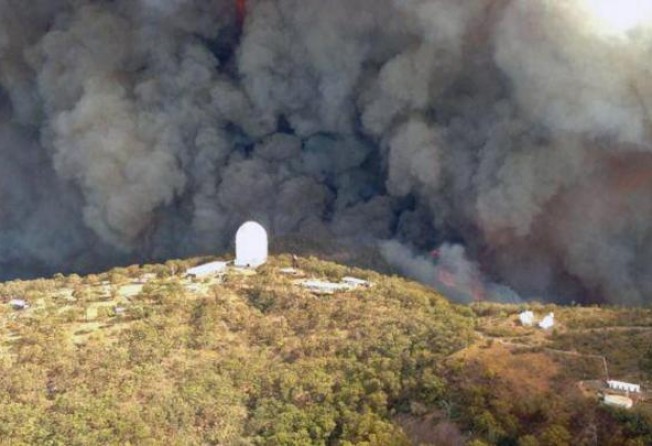Fire scorches Siding Spring Observatory in Australia
Scientists evacuated from one of the world's leading astrophysics centres

Australia's top research observatory, which houses telescopes used by scientists from around the world, was damaged by a large bush fire yesterday as hot weather and storms stoked dozens of new blazes.
The Rural Fire Service of New South Wales, Australia's most populous state, issued an emergency warning for an uncontrollable fire that scorched the Siding Spring Observatory, a remote global research facility near the town of Coonabarabran.
The service described the blaze as "a large and dangerous bush fire".
It said two nearby properties had been destroyed and part of the observatory was damaged by fire. The extent of the damage was unclear, but all observatory staff were safely evacuated.
Siding Spring, a mountaintop site in the Warrumbungle Ranges about 500 kilometres northwest of Sydney, houses 10 operating telescopes run by Australian, Polish, British, Korean and American researchers.
Administered by the Australian National University's research school of astronomy and astrophysics, Siding Spring is the nation's major optical and infrared observatory and one of the top facilities of its kind in the world.
Crews were battling difficult conditions, with temperatures in the area above 40 degrees Celsius and hot northwesterly gusts of about 60km/h.
The fire was burning across a four-kilometre front, with a strong southerly pushing the flames to the north and northeast as night fell.
A partner observatory at Canberra's Mount Stromlo was destroyed by bush fires in January 2003 that killed four people and razed more than 500 homes in the national capital.
Five telescopes, residences and more than a dozen buildings were ruined in the Mount Stromlo inferno, forcing the termination of major projects including a digital survey of the Southern Hemisphere's skies.
Large parts of Australia have sweltered under extreme heat in the past week, sparking hundreds of fires that have destroyed more than 100 homes.
In the northeast state of Queensland trains were halted yesterday due to fears that tracks would buckle under scorching heat that has seen bitumen road surfaces melt in some towns.
Bush fires are a common threat in arid Australia, and the government's Climate Commission has warned that global warming will increase the risk.
Australia's worst bush fire disaster, the Black Saturday firestorm in 2009, claimed 173 lives and destroyed more than 2,000 homes in the state of Victoria, mostly in heavily wooded hills around Melbourne.